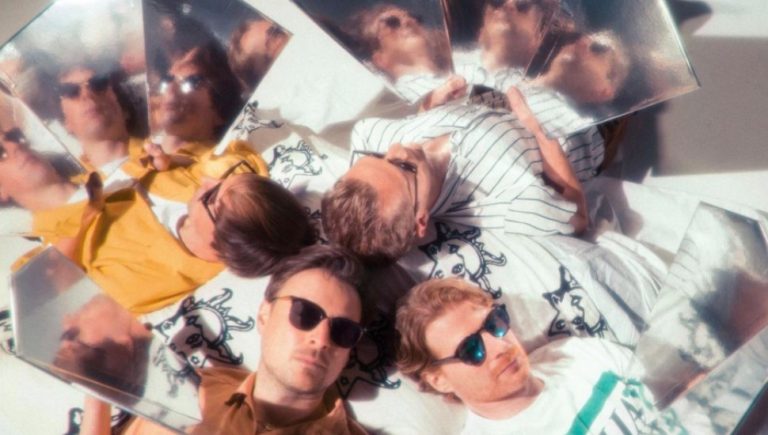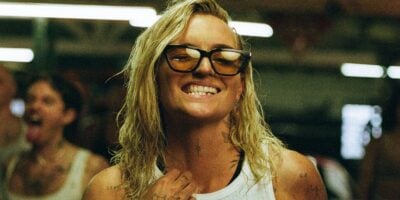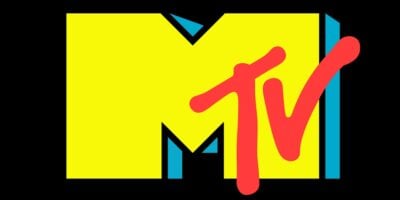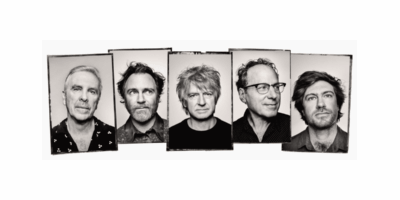It’s safe to say that the new Django Django album Glowing In The Dark couldn’t have come at a better time.
Although the British band finished recording their fourth album a year ago, COVID-19 related delays meant that it was finally released last week.
When listening to the record, it’s hard to believe that it was written prior to the pandemic hitting.
While abstract lyrics are one of the genre-defying band’s signatures, themes of escapism clearly permeate through the album’s 13 tracks.
As it turns out, this was no coincidence, as they had made it their aim to offer a reprieve from the negativity that has shrouded many major world events over the last few years.
Little did they know at the time that avenues of distraction were set to become more universally craved than perhaps ever before.
To celebrate the release of Glowing in the Dark, we spoke to Django Django frontman Vincent Neff about the evolution of the band, working with Charlotte Gainsbourg and how the political climate influenced the album.
Love Music?
Get your daily dose of metal, rock, indie, pop, and everything else in between.
Firstly, we’ve got to touch on COVID-19. How did the pandemic impact the progression of this album?
It’s affected it quite a lot, we did have the album wrapped up by February 2020, so we originally thought we would release it after the UK summer was over. Then that didn’t pan out, so we said: “let’s move it to February 2021, surely everything will be all sorted by that point.” Obviously, that’s not how it happened, so there was an option to move back the release date again. However, we didn’t want the album to sit on the shelf too long and lose its point. So we thought let’s just get it out, people need music and it’s good just to get music out in the world again. We’ve also knocked back a UK tour about three times, it’s scheduled for October and November at the moment but God knows if that’s going to be achievable. I think everyone’s in the same boat really, it’s just kind of watching and waiting to see how things pan out.
Listening to the album, it sounds like you’re going down a more electronic and psychedelic path, what led to this change?
It just feels like a natural progression of where we are heading as a band, like we’re talking about doing a purely electronic album in the future. Django Django has always done music that’s a bit all over a place, it’s just our short attention spans. But the more dancey, electronic stuff is inspired by being at a festival because that type of music always kicks off and goes really well for us. As for the psychedelic stuff, I think it’s kind of always been there but it’s probably just a little bit more obvious than before.
We’re not quite sure why it’s happened this way, we do a track a day and every day we could have a choice of whatever we wanted to do. It might be something to do with the fact that we’re all spread out across the UK, so if Tommy [Grace, synthesizer operator] comes down from Glasgow and it’s me, Dave [Maclean, drummer] and Tommy, then we’ll make a track that’s based around Tommy being there and able to play synth. We are never normally all in the studio at the one time, so it just kind of changes up based on the circumstance.
Check out ‘Glowing in the Dark’ by Django Django:
What would you say are the key differences between Glowing in the Dark and your last album Marble Skies?
I think the storytelling on Glowing in the Dark is better and the lyrics are more direct. We have been doing this thing where we have to be able to describe the subject matter of a song in one sentence. It was really funny because someone would come in and be like, “I have this song with scenes, dreams, skies and lights” and we’d be like,” right… what are you talking about?” [Laughs] We would explain that that was not enough to build a song off and that we needed to come up with a story. We got into that routine and it focused us. Now when someone asks me about a track, I know exactly what it’s about.
Then we’re probably better at the tracklisting and keeping it concise. Normally it’s this democratic thing where we’ll keep a song if someone really likes it, but then you just end up with everything on the album. Now we’re more militant about keeping it short and punchy and not having two tracks that are doing the same thing. In our earlier albums, we were very rambunctious, every song had an outro and intro and stuff like that. It was really fun at the time and I’m glad we did it, but now we think we’re better at keeping it tight and not letting a track outstay its welcome. With the singing, on all our previous records it was two people all the time, but this time we decided to feature just one voice more, instead of these multi-layered harmonies all the time. We said, let’s get a better melody and make it more direct. Those are all the kind of things we knew we could improve on.
Overall, I think it’s fair to say that your sound is ever-evolving but also very distinct…
Well yeah, it’s a bit difficult [to not be distinctive] when it’s not like I’m from New York or London where I can kind of do a spoken word piece, if I did that with my [Northern Irish] accent then I’d sound like a country bumpkin. [Laughs] I suppose with things like the track with Charlotte Gainsbourg, that’s us trying to include little surprises by doing strange collaborations that people wouldn’t expect.
Yeah, how did the collaboration with Charlotte Gainsbourg on ‘Waking Up’ come about? Do you see yourselves doing more collaborations in the future?
Well, we’re both a part of the same record label, which made it easier to happen. When we first played the song without another vocal, Dave suggested that it’d be great to get her involved. She’s Charlotte Gainsberg, so we had no idea whether she’d do it or not, but we leant on a label boss and asked them to sort us out. Luckily Charlotte signed up to do it, and I went over to Paris where she lives to record. I met up with her and we did the vocals in an afternoon. It was really fun and I was quite starstruck because of her family, her acting, her music and the whole shebang.
I think we will just do more collaborations when the opportunity arises, we don’t necessarily set out to do them. It comes about when there’s a track that needs another angle or has a natural gap. We’ve got a track at the moment that has a verse that could do with a Mike Skinner-style spoken word part. When tracks come up that have those little gaps that we don’t think we can fill, we start to think of who would be cool to step in.
Listen to ‘Spirals’ by Django Django:
Like you mentioned, the lyrics on this album are a bit less abstract than your earlier work. Is there a particular message you’re trying to convey?
While we were recording, the Tory government here was being just dreadful and all of this right-wing rhetoric was becoming mainstream. The views that were being spoken about are the complete opposite of what we are. So, we were just trying to find some way of having some positivity, believing that at some stage this will pass and hopefully we’ll get to a more decent place where things like Brexit issues and Donald Trump are kind of gone. So without sounding too cheesy, I think there was a great sense of hope for humanity that we were trying to capture. With that comes an aspect of not listening to the news and trying to imagine yourself somewhere else, because escapism is kind of where we go when those events arise. We just tried to think about creating little worlds and little stories in our songs that could take us out of the humdrum negativity that’s going on in the world.
I grew up in Northern Ireland in the eighties when I was a kid, and that was a really shit place to be at the time. I always admired bands like The Undertones who were from my hometown and whose music was a great distraction from the real crazy shit going on all around us. All my aunties and uncles would go and bring their records home and play them in order to get away from it all and try not to let it infiltrate our heads too much, so I think we’re channelling that.
At the same time, there are tracks like ‘Headrush’ and ‘Night of the Buffalo’ that do have political stories in them, but it’s not very direct or down your throat to the point where it’s obvious what we’re talking about. You can listen to it and enjoy it without knowing the exact meaning behind it, but when you do break it down a bit, you get a little background story.
What inspired you to sing in Portuguese on ‘Got Me Worried’?
We just played it and it had this kind of Tropicana feel, which I’m a big fan of. I could just see Brazil in the 70s, I had this vision that it had this kind of vintage feel to it. We just enjoyed making that mini world, which involved getting a Bossanova guitarist to play with us. As for the lyrics, Dave’s mate has Portuguese parents and she helped write them. She taught me the words, it’s a really difficult language… God knows what I’m singing. [laughs] I know what a couple of the words mean, but as for the rest, they could have just told me to sing anything!
What’s your favourite track from this album?
Probably ‘Night of the Buffalo’ currently, because of the way it was written. It was written in a day, and not through the computer, just people in a circle working out a track together. It came from the embers of a track which was going nowhere, and we just kept the beat. We kind of hit a wall with this other track and were like, “what the fuck are we going to do.” However, we workshopped it and within 20 minutes it was this new thing that we were all really excited about.
We got this guy to play the violin on the track, his name is Raven Bush and he’s Kate Bush’s nephew. He’s as creative as you’d imagine someone with the name Raven Bush to be. He came in and played the strings at the end, where we have this kind of Eastern European/Russian inspired section. He just did this little violin lick and we were like “what was that, do it again” and layered it up. He just wrote it on the spot and we asked him if we could use it, so it all just kind of came from this fun, spontaneous place which is sometimes the best thing.
Check out ‘Free From Gravity’ by Django Django:
I know playing in Australia and going overseas in general probably seems like a lifetime ago, but do you have any standout memories from your time touring Australia?
Tasmania is always amazing to go to, it’s kind of familiar to us in that it’s warm but with a cold wind coming up from the antarctic. We like all the nice wine and the landscape in that part of the country. In contrast, Field Day festival in Sydney was always interesting, because most of the crowd had that ‘been up for three days’ kind of vibe. There were a lot of big guys, so we always had to kind of protect Tommy because he’s got glasses and we had to try to get him through the crowd safely. It kind of reminded us of Northern England, because people had that kind of fighting mentality, which was quite novel. There are loads of amazing memories in Australia, so we’re hoping to get back there soon enough.
What do you see the future of Django Django looking like?
I think we’re just going to keep writing. Social media’s kind of taken over our lives at the moment due to promotion, and we’re not people who are naturally adept at that, we don’t take selfies easily, we’re kind of forced into it. So we’ll be focusing on social media sadly, but we’ll be continuing to write. We’ve got two albums in development, so we’re just putting tracks into different piles. We’ve gotten better at hunkering down on a track and getting it done instead of leaving it unfinished. Whether it’s a crap track or a good track, it doesn’t matter because it’s done and you can put it in a pile. I think we’ve figured out a good working method now, which took us a couple of albums to do.
Listen to the new album Glowing in the Dark by Django Django:


































